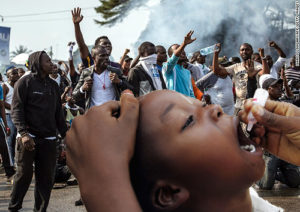 Rotary Charity and Gabon Wealth, two very different issues this morning that teach a similar lesson: you can’t buy success.
Rotary Charity and Gabon Wealth, two very different issues this morning that teach a similar lesson: you can’t buy success.
The oil rich country of Gabon remains unsettled this morning following contested elections and days of violence. A third case of the presumed eradicated polio was confirmed this morning in Nigeria.
Two extremely different African tales share an amazing similarity. Both of them were completely predictable and for the same reason. Let’s start with Gabon.
One of Africa’s smallest countries (the size of Oregon) it has one of its highest per capita incomes ($18,600) with only a small 1.7 million population. Located in what archaically we called “The Armpit” of Africa, this is where the western arm of the continent turns abruptly south into the stem. The area got its nickname because this is mostly hot, humid lowland jungle. It really was the “pits” of Africa … until oil was discovered.
It’s where I saw my first (lowland) gorilla, had my first encounters with pygmies and where I probably got sickest in my early travels through Africa. Few tourism ventures have been tried there, and the two or three that I know persist aren’t doing well. Unless you’re a gorilla or a pygmy, you won’t do well here.
But when oil was discovered a decade or more after I and many others abandoned any thoughts of developing the place for tourism, things changed fast. And that’s the problem : fast.
The onslaught of wealth to this poorest of the poor places just couldn’t go well. Let’s start with banks. There weren’t any. The Port of Libreville is one of the most unfit docking places in Africa, so to begin with the oil that is found here off shore in the Gulf of Guinea can’t get back into the country. A gallon of ordinary car gas in Gabon today is around $3.20.
When oil was discovered offshore in the early 1970s and began flowing by the end of that decade there were probably fewer educated people in the whole country than on the oil rigs. That has changed: fast.
If you believe in the concept that success comes in large part from seizing opportunity, then imagine the young people growing up in Gabon in the 1980s and 1990s. Laws were scant. There weren’t business practices because there hadn’t been businesses. “Seize” is the operative word, and they did. Gabon by the end of the last century was a wild west business circus.
Today almost two-thirds of its population lives in abject poverty, perhaps half of those near subsistence. A small fraction is super rich.
Fourteen years ago the former colonial power, France, saw all this coming. France engineered a dictatorship, recognizing that the lack of legacy in government or social ethics lent itself to extreme exploitation. Last year with the death of the dictator, all hell broke loose: it’s called democracy.
The man who lost and now cries foul was the African Union Commissioner of elections who gave some of the continent’s most disreputable elections his signature of approval.
About the same time that large amounts of Gabon oil began flowing into the world markets, Rotary International decided to eradicate polio. It was called the Polio Plus Campaign.
In the fourth decade since the campaign began, polio persists and many of us knew it would. All of the people in the public health arena knew it would. But Rotary’s bombastic approach to “goodness” was unstoppable. To date, Rotarians have donated almost $1.5 billion to the campaign.
“We didn’t need medical people, we could do it ourselves,” former Rotary President Clem Renouf said at his retirement regarding Polio Plus.
Doing It Ourselves is a very democratic concept. It’s what the people of Gabon seized on during last month’s election. But in Gabon’s case, developing too fast, or Rotary International’s case, doing it without enough expertise, the outcome will always be disappointing.
You can’t buy success. Gabon needs time to master democracy. Eradication of polio needs government-to-government orchestration of intense expertise. Gabon doesn’t have time. Rotary is not a country or global government institution. Gabon is … a very young country in the modern sense. Rotary is a weekly businessman’s club.
Good intentions do mean something, and generosity should be encouraged. But you can’t buy success.
Jim, I think you are being unduly harsh on Rotary and their efforts to eradicate polio. There is indeed governmental support in many counties where the vaccination program is active. The Gates Foundation also is a major source of support. Let’s look where we are. In the 1950’s we had a pandemic. My mother was afraid to let me out of the house. In 1988, while the disease was no longer pandemic in the acute sense, there were, according to WHO statistics some 350,000 cases worldwide. Last year there were 74 cases confined to two countries, Afghanistan and Pakistan. That’s a >90% decrease. Yes, there are 3 (that’s 3 as in less than 10) cases in Nigeria and perhaps more in the north, but look where we’ve come! Last year there were more cases of whooping cough in California than polio in the world. I know you like government to do everything but in developing countries it’s often more of a hindrance. As an aside, I’m not sure polio will ever be totally eradicated. Unlike smallpox, polio is caused by an enteric virus and will contaminate water sources in developing countries. Think cholera here. But polio certainly can be efficiently controlled and vaccination programs like those supported by Rotary stand an excellent chance of protecting the entire world, including developing countries from a repeat of the pandemic of the 1950s.